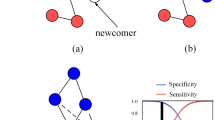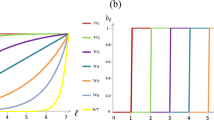Abstract
We propose a simple yet effective theoretical model for the evolutionary threshold public goods game with binary contributions (the fair personal share or nothing), incorporating the effect of collective risk. We distinguish two distinct public goods games according to whether to return the contributions when the target is not collected. For the two cases, in order to study the impact of collective risk on cooperation, we analyze dynamics of the population which can be represented by the replicator equations. It shows that high rate of loss can enhance the emergence of social cooperation and the provision of public goods. Furthermore, other elements also can promote the cooperation, such as large initial endowment and small threshold. Interestingly, for large group size, it has a positive impact on cooperation in the case of returning the donation amount, whereas a negative impact in the case of no return.
Preview
Unable to display preview. Download preview PDF.
Similar content being viewed by others
References
Binmore, K.G.: Playing Fair: Game Theory and the Social Contract. MIT Press, Cambridge (1994)
Colman, A.M.: Game Theory and Its Applications in the Social and Biological Sciences. Butterworth-Heinemann, Oxford (1995)
Hauert, C., Michor, F., Nowak, M.A., Doebeli, M.: Synergy and Discounting of Cooperation in Social Dilemmas. J. Theor. Biol. 239, 195–202 (2006)
Okada, D., Bingham, P.M.: Human Uniqueness-Self-Interest and Social Cooperation. J. Theor. Bio. 253, 261–270 (2008)
Kagel, J.H., Roth, A.E. (eds.): The Handbook of Experimental Economics. Princeton University Press, Princeton (1995)
Sigmund, K., Hauert, C., Nowak, M.A.: Reward and Punishment. Proc. Natl. Acad. Sci. USA 98, 10757–10762 (2001)
Fehr, E., Gachter, S.: Altruistic Punishment in Humans. Nature 415, 137–140 (2002)
Hauert, C., Traulsen, A., Brandt, H., Nowak, M.A., Sigmund, K.: Via Freedom to Coercion: The Emergence of Costly Punishment. Science 316, 1905–1907 (2007)
Szabo, G., Hauert, C.: Phase Transitions and Volunteering in Spatial Public Goods Games. Phys. Rev. Lett. 89, 118101 (2002)
Santos, F.C., Santos, M.D., Pacheco, J.M.: Social Diversity Promotes the Emergence of Cooperation in Public Goods Games. Nature 454, 213–216 (2008)
Hauert, C., Monte, S.D., Hofbauer, J., Sigmund, K.: Replicator Dynamics for Optional Public Good Games. J. theor. Biol. 218, 187–194 (2002)
Hauert, C., Holmes, M., Doebeli, M.: Evolutionary Games and Population Dynamics: Maintenance of Cooperation in Public Goods Games. Proc. R. Soc. B 273, 2565–2570 (2006)
Milinski, M., Sommerfeld, R.D., Krambeck, H.J., Reed, F.A., Marotzke, J.: The Collective-Risk Social Dilemma and the Prevention of Simulated Dangerous Climate Change. Proc. Natl. Acad. Sci. USA 105, 2291–2294 (2008)
Bagnoli, M., Mckee, M.: Voluntary Contribution Games: Efficient Private Provision of Public Goods. Econ. Inq. 29, 351–366 (1991)
Bach, L.A., Helvik, T., Christiansen, F.B.: The Evolution of n-Player Cooperational Threshold Games and ESS Bifurcations. J. Theor. Biol. 238, 426–434 (2006)
Pacheco, J.M., Santos, F.C., Souza, M.O., Skyrms, B.: Evolutionary Dynamics of Collective Action in N-person Stag Hunt Dilemmas. Proc. R. Soc. B 276, 315–321 (2009)
Taylor, P., Jonker, L.: Evolutionary Stable Strategies and Game Dynamics. Math. Biosci. 40, 145–156 (1978)
Hofbauer, J., Sigmund, K.: Evolutionary Games and Population Dynamics. Cambridge University Press, Cambridge (1998)
Author information
Authors and Affiliations
Editor information
Editors and Affiliations
Rights and permissions
Copyright information
© 2009 Springer-Verlag Berlin Heidelberg
About this paper
Cite this paper
Wang, J., Ren, F., Zhu, M., Wang, L. (2009). Information Dynamics and Intelligent Cooperation in Networked Societies. In: Yu, W., He, H., Zhang, N. (eds) Advances in Neural Networks – ISNN 2009. ISNN 2009. Lecture Notes in Computer Science, vol 5551. Springer, Berlin, Heidelberg. https://doi.org/10.1007/978-3-642-01507-6_12
Download citation
DOI: https://doi.org/10.1007/978-3-642-01507-6_12
Publisher Name: Springer, Berlin, Heidelberg
Print ISBN: 978-3-642-01506-9
Online ISBN: 978-3-642-01507-6
eBook Packages: Computer ScienceComputer Science (R0)




